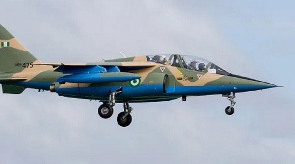The Nigerian Air Force (NAF) has carried out air strikes to clear the northeast of terrorists, resulting in the Nigerian leader of the Islamic State of West Africa Province (ISWAP), Ba'a Shuwa, and 32 IS fighters.
Ba'a Shuwa was the leader of the Nigerian ISWAP terrorists, an affiliate of ISIS operating in many villages in the Lake Chad region of north-eastern Nigeria's Borno State and border towns with Chad, Niger and Cameroon.
Zagazola Makama, a counter-insurgency expert and security analyst in the Lake Chad region, confirmed the major strike, saying that the devastating airstrikes carried out in early January targeted Kwatan Dilla in Abadam local government area of Borno state.
He reported that exploitation after the strike showed footage of scores of enemy elements and equipment neutralized.
Shuwa was appointed in 2021 after the leader of the Boko Haram insurgents, Abubakar Shekau, killed himself.
He commanded terrorists in Chiralia, Markas Kauwa, Abirma, Buk, Abulam, Dusula, Abbagajiri, Gorgore, and many other camps within the Timbuktu and Alagarno axis in Southern Borno.
Some of his top commanders include; Khaid Hanzala, Ba'a Idirisa, Rawana, Abou Ibrahim, Mallam Abubakar, Abou Aisha, and Abou Khalid who was responsible for the recent attack on electricity installations on the Maiduguri-Damaturu highway.
Ba'a Shuwa and his groups of terrorists are mainly responsible for attacks, ambushes, and IEDs/mines on Damboa roads, Damaturu-Maiduguri, Askira, Buratai, Buni Yadi, Buni Gari, Gaidam and other parts of Borno and Yobe states.
He said the terrorists were hiding in highly fortified hideouts under thick foliage and rocks, well concealed and camouflaged to evade air strikes within the Timbuktu Triangle in the Sambisa Forest.
Also, the Director of Public Relations and Information of the Nigerian Air Force (NAF), AVM Edward Gabkwet, said in Abuja on Sunday 7 January that another raid had been carried out in Paris, killing 12 terrorists.
He explained that the air force carried out the raid after it discovered that terrorists were moving items suspected to be arms and ammunition into the area.
He said Parisu, a location near Sambisa Forest, was once a terrorist enclave that had been abandoned after troops cleared the area of terrorist activities.
He said the convergence of the terrorists at the location raised suspicion about their intention and plan, hence the order to attack the location.
According to him, the aftermath of the strikes resulted in a huge ball of fire from two adjacent points in the vicinity, while some surviving terrorists were seen scampering for safety.
"Feedback also revealed that 12 terrorists were neutralized in the strike and their logistics destroyed, thereby reducing their ability to attack soft targets and their troops.
"Similar strikes were also carried out at a location about 1.5km southwest of Tumbun Agiri within the Tumbuns in the Lake Chad region on January 6.
"Intelligence gathered over time had revealed the continuous gathering of armed terrorists in pick-up vehicles and motorcycles, hence the go-ahead to attack the location.
"The precision strikes on the location resulted in the destruction of the vehicles and motorcycles as well as the elimination of several terrorists," he said.
Gabkwet said the air component had struck some random targets in Tumbun Alura during an aerial reconnaissance mission on January 2, 2024.
He said the targets, consisting of three canoes, were observed loaded with suspected Premium Motor Spirit (PMS).
According to him, they were subsequently engaged with a huge explosion observed afterwards.
"Similar successful attacks were also carried out at Tumbun Buwari and Sabon Tumbun on terrorist structures within the Lake Chad region," he added.
Africa News of Monday, 8 January 2024
Source: theeastafrican.co.ke
Nigerian Air Force kill terrorists’ commander and 32 IS fighters
 A Nigeria Air Force fighter jet. Nigerian Air Force has killed terrorists’ commander and 32 IS fight
A Nigeria Air Force fighter jet. Nigerian Air Force has killed terrorists’ commander and 32 IS fight
Entertainment















